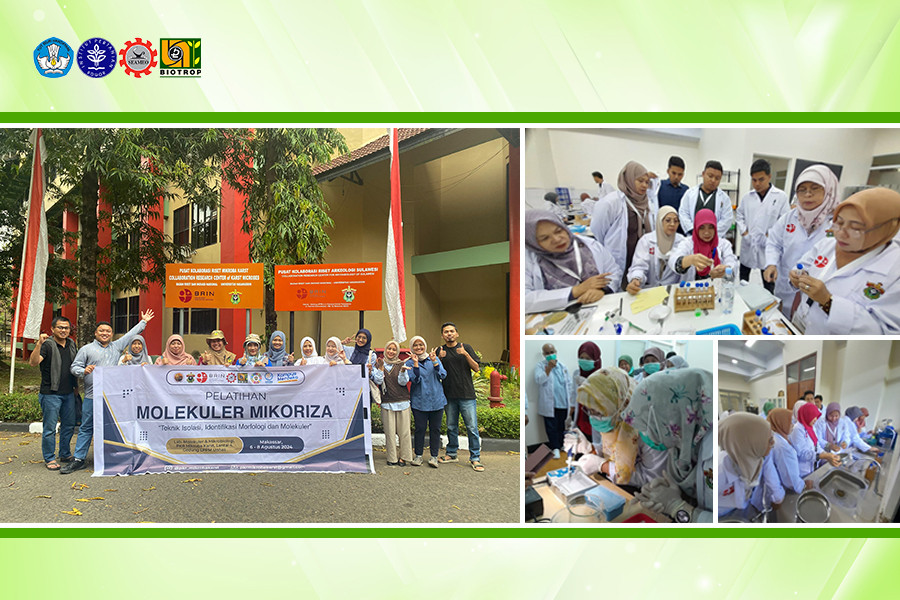Makassar, 9 August 2024 - In an effort to explore the biological agent for rehabilitating degraded karst areas, Karst Microbe Research Collaboration Center of Hasanuddin University, National Research and Innovation Agency, and SEAMEO BIOTROP conducted the Molecular Mycorrhiza training: "Isolation techniques, Morphological and Molecular identification". This training was held on 6 – 9 August 2024 at the LPPM (Institute for Research and Community Service) Hasanuddin University - National Research and Innovation Agency, Makassar offline.
The event attracted 15 participants from diverse backgrounds, including university lecturers, students, researchers, government officials, and representatives from the private sector, all of whom are actively engaged in mycorrhizal research and applications.
“One of the roles of Mycorrhiza can be used as a biological agent for rehabilitating degraded karst areas, so it is essential to learn about Mycorrhiza, one of which is related to the molecular aspect.” Stated by the Head of the Karst Microbial Research Collaboration Center, Dr. Siti Halimah Larekeng, during her opening remarks of the training. She also stated that the target of the Karst Microbial Research Collaboration Center at Hassanudin University is to become a reference for researching and developing potential karst microbes, including Mycorrhiza.
Prof. Muh. Nasrum Massi, Ph.D., Sp.MK, Head of LPPM Hasanuddin University, highlighted the importance of interdisciplinary collaboration in addressing complex environmental challenges. “By integrating various disciplines and pooling unique resources such as technology, data, and expertise, collaborative efforts can lead to innovative solutions,” he noted.
The resource person for this training is Ms. Risa Rosita, S.Si., M.Si., Head Section of Environmental Technology and Security at SEAMEO BIOTROP. Her sessions covered a range of topics, including an introduction to tools for morphological and molecular identification of mycorrhizae, an overview of mycorrhizae, techniques for extracting and isolating mycorrhizal spores, and methods for mycorrhizal DNA extraction.
A key highlight of the training was the successful amplification of six mycorrhizal samples using the PCR (polymerase chain reaction) technique, demonstrating the practical application of the knowledge gained. Mycorrhizae are vital in addressing climate change due to their significant impact on the carbon cycle, plant resilience to environmental stress, and overall ecosystem health. (rr, hcn)
The event attracted 15 participants from diverse backgrounds, including university lecturers, students, researchers, government officials, and representatives from the private sector, all of whom are actively engaged in mycorrhizal research and applications.
“One of the roles of Mycorrhiza can be used as a biological agent for rehabilitating degraded karst areas, so it is essential to learn about Mycorrhiza, one of which is related to the molecular aspect.” Stated by the Head of the Karst Microbial Research Collaboration Center, Dr. Siti Halimah Larekeng, during her opening remarks of the training. She also stated that the target of the Karst Microbial Research Collaboration Center at Hassanudin University is to become a reference for researching and developing potential karst microbes, including Mycorrhiza.
Prof. Muh. Nasrum Massi, Ph.D., Sp.MK, Head of LPPM Hasanuddin University, highlighted the importance of interdisciplinary collaboration in addressing complex environmental challenges. “By integrating various disciplines and pooling unique resources such as technology, data, and expertise, collaborative efforts can lead to innovative solutions,” he noted.
The resource person for this training is Ms. Risa Rosita, S.Si., M.Si., Head Section of Environmental Technology and Security at SEAMEO BIOTROP. Her sessions covered a range of topics, including an introduction to tools for morphological and molecular identification of mycorrhizae, an overview of mycorrhizae, techniques for extracting and isolating mycorrhizal spores, and methods for mycorrhizal DNA extraction.
A key highlight of the training was the successful amplification of six mycorrhizal samples using the PCR (polymerase chain reaction) technique, demonstrating the practical application of the knowledge gained. Mycorrhizae are vital in addressing climate change due to their significant impact on the carbon cycle, plant resilience to environmental stress, and overall ecosystem health. (rr, hcn)
 Wednesday, 21 August 2024 on 3:34pm
Wednesday, 21 August 2024 on 3:34pm
